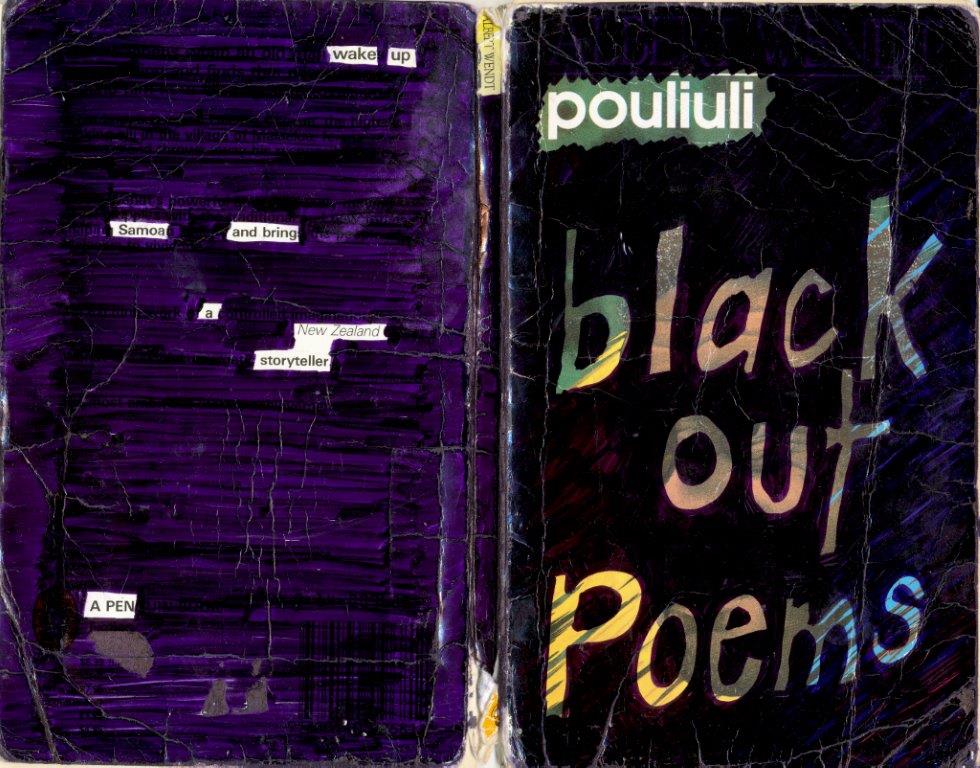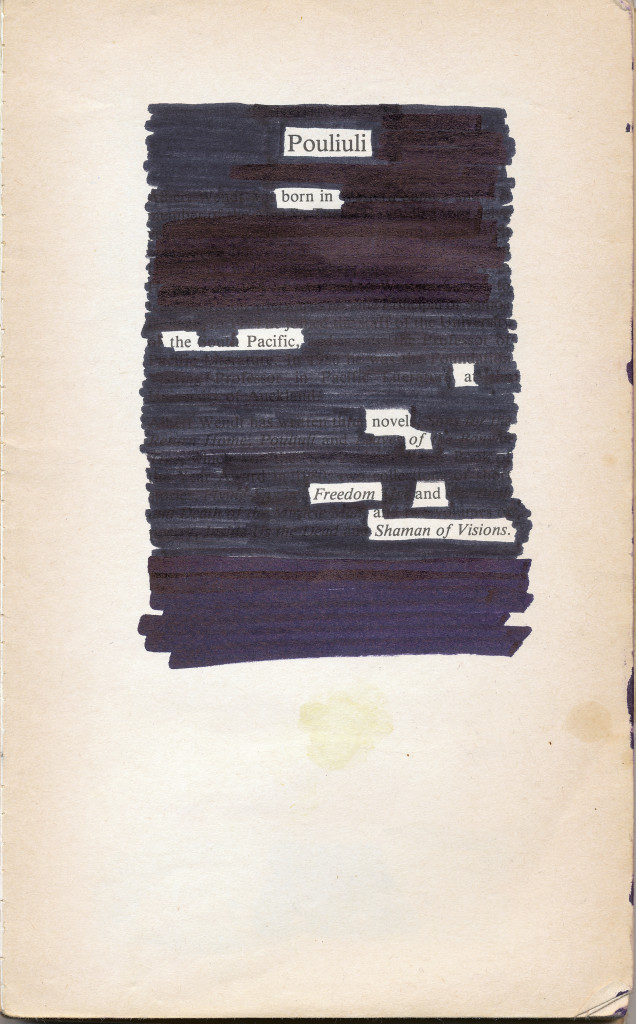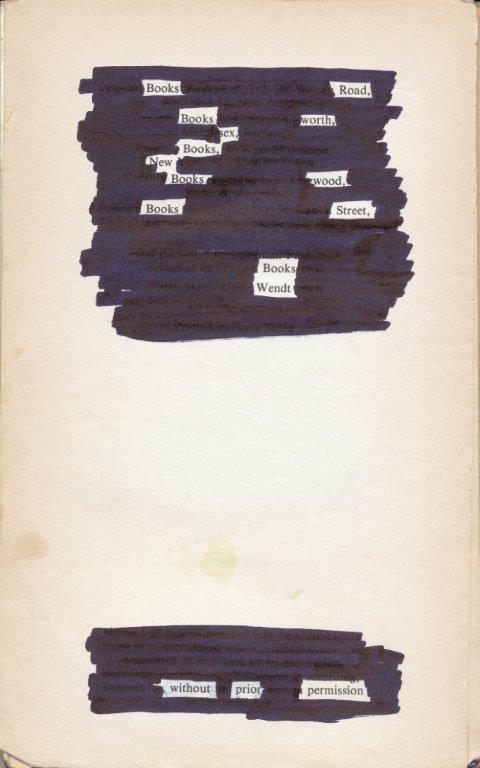Over the last 50 years, contemporary Pacific Islander poets have crated a vibrant and diverse range of poetry, fiction, and nonfiction. Even though this literature has circulated within and beyond the Pacific, it still remains marginalized in studies of global literature.
This folio of poetry presents a modest sampling of five poets who have genealogical roots in Samoan, Maori, Chamoru, and Tuvaluan heritages. Several of them currently reside in Hawaiʻi and Aotearoa/New Zealand, while one lives in California. Even though the themes the poets address—including identity, family, home, and culture—are prevalent in Pacific literature, each writer approaches these topics with their own unique style and voice.
I hope you will enjoy this collection and seek out the work of these writers both online and in print.
—Craig Santos Perez
William Alfred Nu’utupu Giles is a Samoan-American poet from Honolulu, Hawaii. He is a Kundiman Fellow who studied with the First Wave program at the University of Wisconsin, Madison. Will works as the Workshop Coordinator for Pacific Tongues on Oahu, is a Brave New Voices International Poetry Slam Champion, and is the 2015 National Underground Poetry Slam Champion.
Prescribed Fire
as some of the tallest trees in the world
redwoods can grow to over 350 feet above the earth
yet their roots, on average only travel 10 feet into it
in isolation, it should be physically impossible for them to stand
however, these enormous trees do not grow in isolation
their roots, each only a single inch thick
wraps around the roots of it’s neighbors
a stubborn foundation of brown fingers
clasps an underground stand
and grows
my family is a group of redwoods
that sought god instead of ground
when my mother immigrated to the united states from Samoa
she taught none of her children how to speak our native tongue
now 26 years later
I cannot feel the hands
of the land I come from
how do you stand when your roots
have been burned away
today I am a tree toppling over
a man cut off at the knees
stuck between a loved language lost
and a sky still out of reach
and that is the true legacy of world war II in the Pacific
a generation of Islander and Asian immigrants who learned
that their foreign accents and different skin
could mean your family in internment camps
learned their place in this society
could only be bought with blood in uniform
they learned their citizenship papers
would only be traded for their severed tongues
it is true
that the branches of a tree may spread no wider than it’s roots
but when parent countries
are just another word for poverty
when you are made to choose
between putting your children in culture or clothing
which blood would you want?
this is how redwoods fall
they forget the only reason
they are able to stand and defy common logic
is how well they hold one another
in Hawai’i
an immigrant mecca
where so many of us try to stand with a lost past
we have old weeping banyan trees who also came from across that sea
these banyan’s start from seeds that are blown to other canopies
and without pity or regard for past
they create their own way to the ground
sprouting aerial roots that crawl to the earth
and make a home wherever they find it
in Polynesia,
we have always learned from the earth around us
so now I do not lament my lack of roots
instead, I grow them myself
so every day I am a windblown seed
I am “foreign” accents and different skin
every day I fall towards the earth and am reborn in dirt
I am blood in uniform and severed tongue
every day, I am the blood I want
every day, I look around
hold on tight to those I love
and I grow
into an extended
family
tree
Tusiata Avia has published two books of poetry, Wild Dogs Under My Skirt and Bloodclot and two children’s books. Known for her dynamic performance style she has also written and performed a one-woman show, also called Wild Dogs Under My Skirt. Tusiata has held a number of writers’ residencies and is regularly published in international literary journals and invited to appear at writers’ festivals around the globe.
Demonstration
The thing is
even after all these years
even after all you know
after all the times you have spoken
to classrooms full, divided them into four
pointed to one quarter and said:
All you people have been sexually abused
to get the message across.
And then listened to them unbutton their stories
shame and anger lighting them up like brilliant torches
firing the night inside them
the blackness all around
a thousand bright bombs falling from the sky.
The thing is
after speaking through the mouths of every kind
of good girl
girl child
bad girl
slut.
After reading
and talking and posting
the drain out of it
and then have it tunnel
back up through you like a worm
as big as an earthquake
and disappear again.
Even after marching
at the anti-rape demonstration today
with your six year old daughter’s hand in yours
and a sign pinned to her small chest:
‘Believe Survivors’
even now, as you stand here in the Square
you wonder
because it was 25 years ago
and you did kind of like him
even though he was a bit of a Fob.
You wonder
because it was the Samoan Students’ Association so’otaga
and you were the president the year before
the first woman, the first New Zealand-born, the first afa kasi
and it was in your home town
and you helped him find a place to stay
you picked him up from the airport
it made you feel helpful
and kind and involved
and you did kind of like him.
You wonder
because after one of the association parties
you were a bit drunk and ended up sleeping
in the lounge of the house he was staying in
and kind of hoping something would happen
in the same way you would hold a tiny, fragile creature
in your loosely caged hands
maybe a butterfly or a newborn mouse
and offer that delicate thing up
to him and hope he might
ease it gently from you
so as not to hurt it
and maybe he’d even offer something back.
Because of that
you let him kiss you
on the floor
before it turned
from a hopeful kiss with a guy
you kind of liked
to him on top of you
and you saying:
No, stop it!
Because he’d stopped kissing you now
and even though he was shorter than you
he was a hell of a lot stronger than you could’ve imagined
and was prying you apart.
You wonder
because when you realised what was happening
you knew you didn’t want that
and you told him: I don’t want this. Stop!
But the thing is
he didn’t stop
he just kept going
he didn’t say anything
and you swore at him:
Fucking get off me!
I don’t want this
I don’t want this
you said:
I don’t want this.
But he just kept going
and didn’t say anything at all
until he was finished
when he rolled off you and said:
It’s no big deal.
That’s all he said.
And you wonder
now, in the Square
if you could’ve fought harder
or not slept in the lounge
or not let him kiss you
or not kind of liked him
or not hoped he might like you too.
And you remember
that the next morning
when you got to your mother’s place
you looked at yourself in the hall mirror and thought:
I’ve just been raped.
And then you had a shower
and changed into your church clothes
and went to the church service with everyone else
and he was there.
And when you returned to teachers’ college in Auckland
you couldn’t function
you kept seeing him in the cafeteria
and everywhere
and you kept cracking up
and missing classes
and when you finally went to the counsellor
and talked about it
she said: Have you heard yourself?
You keep saying:
It’s no big deal.
So, today
twenty-five years later
as you watch this young woman
in the Square
the age you were then
take her clothes off in protest
you wonder again
whether it was rape
and whether it might have been your fault.
IT WAS NOT MY FAULT IT WAS RAPE IT WAS NOT MY FAULT IT WAS RAPE IT WAS NOT MY FAULT IT WAS RAPE IT WAS NOT MY FAULT IT WAS NOT MY IT WAS NOT MY FAULT FAULTITWASNOTMYFAULTITWASRAPEWASWASNOTMYFAULTITWASRAPEITWASNOTMYFAULTITWASRAPEITWASNOTMYFAULTITWASRAPEITWASNOTMYFAULTITWASRAPEITWASNOTMYFAULTITWASRAPEITWASNOTMYFAULTITWASRAPEITWASNOTMYFAULTITWASRAPEITWASNOTMYFAULTITWASRAPEITWASNOT
MYFAULTITWASRAPEITWASNOTMYFAULTITWASRAPEITWASNOTMYFAULTITWASRAPEITWASNOTMYFAULTITWASRAPEITWASNOTMYFAULTITWASRAPEITWASNOTMYFAULTITWASRAPEITWASNOTMYFAULTITWASRAPEITWASNOTMYFAULTITWASRAPEITWASNOTMYFAULTITWASRAPEITWASNOTMYFAULTITWASRAPEITWASNOTMYFAULTITWASRAPEITWASNOTMYFAULTITWASRAPEITWASNOTMYFAULTITWASRAPEITWASNOTMYFAULTITWASRAPEITWASNOTMYFAULTITWASRAPEITWASNOTMYFAULTITWASRAPEITWASNOTMYFAULTITWASRAPEITWASNOTMYFAULTITWASRAPEITWASNOTMYFAULTITWASRAPEITWASNOTMYFAULTITWASRAPEITWASNOTMYFAULTITWASRAPEITWASNOTMYFAULTITWASRAPEITWASNOTMYFAULTITWASRAPEITWASOTMYFAULTITWASRAPEITWASNOTMYFAULTITWASRAPEITWASNOTMYFAULTITWASNOTMYFAULTITWASRAPEITWASNOTMYFAULTITWASRAPEITWASRAPEITWASNOTMYFAULTITWASRAPEITWASNOTMYFAULTITWASRAPERAPERAPERAPE.
Serena Ngaio Simmons is an accomplished spoken word artist of Maori and European descent born and raised on Oahu. Serena has attended and competed in the Brave New Voices international spoken word competition in 2011 and 2012. Serena is currently pursuing her Bachelors in English at the University of Hawaii at Manoa.
Aotearoa Love Poem
The first time I fell in love,
I was on a beach in Aotearoa
staring at rock faces spread out like a sun dial
in front of me.
It was a Sunday afternoon in June
flakes of pipi shell smiling face up through the sand
the ocean,
tossing bits of salt at my neck
my friend,
like maroro in the frigid shore breaks
All I could see was the cliffs
those moss shouldered giants
nga kaitiaki strong in their posts,
clever anglers, my land,
fishing half of my heart out while I gawked
mouth agape at all that prowess,
they hooked a slice out of me
when I wasn’t paying attention,
heaved it in
kept it for themselves.
Feet buried in clay shaded coast,
I made sure to stain my teeth
with every bit of it, lodge the sand
further into my nails,
swallow the saltwater as it dripped from my bangs,
keep whatever I could without taking, if only
I didn’t have to leave.
I wouldn’t have been so selfish during my visit,
forgive me,
this is love
and I don’t know what I’m doing.
It has taken me eight years
to find home,
eleven days to learn just how real
love can be, how much
howling a heart is capable of
when it is missing roots, the hours spent
counting the days until I have to climb back on that plane
my chest
is a halved quarry I have been trying to make rich again.
I am finding it harder every day to breathe through a fraction
this must be
what all my friends were talking about
what Neruda was saying when he wrote,
don’t go far off… the smoke that roams
looking for a home will drift into me
Aotearoa, you’ve baked a chimney
into my throat, filled it with drift
there is a fire crackling
behind my teeth and I am too afraid
to show it to anyone lest they try to suffocate it
conversations are brief and always end smelling like
fresh smoke, it is getting harder
to find people who understand this
We can all speak distraction
few people can speak homesickness
sunrise on the pae pae
kumara and table salt
cups of milo in the den
and your mountains
nga maunga
sneaking away a piece of me
a reminder
to hurry back
Courtney Sina Meredith was born in 1986, she launched her first book of poetry Brown Girls in Bright Read Lipstick (Beatnik Publishing) at the Frankfurt Bookfair in 2012, her play “Rushing Dolls” (Playmarket) was anthologised later that year. She was the Bleibtreu Berlin writer in residence 2011, and in 2014 she was invited to the House of Lords by the BBC to discuss the cultural future of Britain. Her poems have appeared most recently within Atelier (Italy), I Sit Like a Garbage God (Brussels) and Best Essential New Zealand Poems: Facing the Empty Page (NZ).
SHADOW ON THE HEART
We’re in a hospital
going around touch the ground
no patients staff sit everywhere
alike tables amounting to steam.
Staff walk everywhere
late nights bad ideas
you want to order?
I’m not eating remember
Brick Lane antiques
bottom floor coffee
in the dark it was a decent
place to fall for shiny things.
A. she hasn’t lived our life
so she just doesn’t understand.
B. different chambers of course, septum
the dividing wall is what she’s like.
C. why care?
Thank you for waiting
sorry about the wait
sorry about that. Our fault
old computers bad habits.
They got held up this morning
a peculiar case a sweetheart.
Is that a species known to be friendly? Tiger goldfish
eat plastic soldiers. New women come to relieve
those and their friends gently ushered away.
Where do they take the receiving chambers
for a walk on the beach for a day in the sun
for a break from the blood flowing through.
Clarissa Mendiola is a Chamoru woman who was raised in California. Through segmented essays and poetry, her work explores ideas of cultural identity and ethnic purity via memory, myth, oral and written history, and the ways in which all of these things work toward or against the overarching question–what does it mean to be Chamoru? Her lineage includes the Santos family of Talofofo (Familian Manok) the Mendiola family of Barrigada. She has an MFA in Writing from California College of Arts and currently lives in San Francisco where she thinks, writes, and dreams about Guahan.
REUNION
at a barbeque they sing
karaoke in the back
kitchen framed only
by waxed edges of looming
jungle wailing
their taut brown heads
cocked back releasing jagged
notes into dense night they
rest their arms on each other
on dad his fair spanish
skin made fairer by three
and a half seasons of california
coast and the contrasted dark
trunks of his friends’ arms
i wonder what distances
they bridge with this affection
what loom of land focuses
what species of bird indicates
approach
Dr Selina Tusitala Marsh is an Auckland-based Pacific poet and scholar of Samoan, Tuvaluan, English, Scottish and French descent. She is the author of two collections of poetry, Fast Talking PI (2010) and Dark Sparring (2014). She is a professor of Pacific literature at the University of Aukland, New Zealand.






